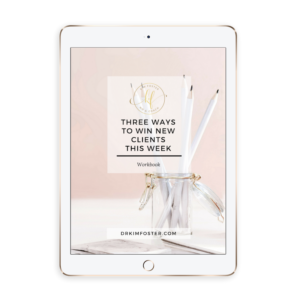
Do you feel like you’re pretending? Do you feel like you’re a fraud in your coaching business, and everyone is about to find out the truth about you? That’s the feeling of Impostor Syndrome, and it’s what I tackle in this week’s podcast episode and blog post. If Impostor Syndrome is something you struggle with, keep reading.
Impostor Syndrome can really hold you back from achieving your full potential. In this episode and blog post I provide four key strategies for overcoming Impostor Syndrome and finding true confidence.
So let’s dive in!
If you’d rather listen than read, here’s where you can tune in to this episode:
The term Impostor Syndrome is not a new thing, but I’ve noticed more and more people are talking about it–which is GREAT. It can be a real problem for many of us. But the good news is that there are ways to conquer it.
And I have noticed a lot of health coaches struggle with Impostor Syndrome–especially NEW coaches–and it can really hold you back from achieving your full potential. Today I have 4 tips for beating Impostor Syndrome.
So let’s get started.
First, let’s talk about what impostor syndrome IS.
“The imposter syndrome is a psychological term referring to a pattern of behavior where people doubt their accomplishments and have a persistent, often internalized fear of being exposed as a fraud.” – Psychology Today
It’s when you have a story, or a belief, about why you’ve achieved what you have.
Impostor syndrome is really the feeling of either 1) self doubt, 2) inadequacy, 3) fear, or 4) shame.
It often makes you feel like you don’t deserve the things you’ve achieved or accomplished. It makes you feel like you’re unworthy.
And trust me, this is very common.
I had a pretty bad case of impostor syndrome in my very early years of finishing all my medical training. When I first became a doctor I had a persistent thought that somebody was going to come along and say “sorry, we’ve made a terrible mistake, we didn’t mean to grant you that M.D., we’re going to need that back now.”
It was very uncomfortable.
Particularly in a position where it’s important that people have confidence in your knowledge and skills…it’s really hard to function in a way that inspires confidence when there’s a part of you that has a persistent belief that it isn’t true anyway.
I would have to constantly remind myself, and reassure myself that it was real, that I didn’t imagine all those years of study and training…they happened, I learned, I graduated, and I was a licensed physician.
I think it’s why I was sensitive to people’s reaction when they would comment on how young I looked, in medical visits. I did look young for my age, and truthfully, I was young — I finished all my training when I was 28, and was a fully licensed family physician at that age, but I looked several years younger than that, as people could not help themselves saying to me. And this absolutely triggered my impostor syndrome, for sure. Because I felt like what they were saying is “you can’t possibly be the doctor here. You’re way too young.” Or…”could you please call in the actual doctor, little girl? Stop playing pretend.”
Now, they may not have been meaning anything at all along those lines…but that was the STORY I was telling myself they were thinking when they would comment on my age.
And it really made it hard for me to get out of that Impostor Syndrome mindset when I was being reminded of it so often.
So, point is, I totally feel you, if you have struggled with Impostor Syndrome, or you’re struggling with it now.
But no worries, I have some solutions, and some ways to overcome it, so let’s get into that.
Tip #1: Get Perspective
For starters, it can be helpful to know that many people–famous people, highly respected people–have publicly admitted they have impostor syndrome. Those of us who experience the discomfort of impostor syndrome often feel like we’re the only ones who feel like impostors. But the opposite is true. There’s a very good chance that other people in the room–at your meeting, your social event, the conference–feel the exact same way.
Michelle Pfeifer is quoted as saying: “I still think people will find out that I’m really not very talented. I’m really not very good. It’s all been a big sham.”
The former Director-General of the World Health Organization, Dr. Margaret Chan, has said: “There are an awful lot of people out there who think I’m an expert. How do these people believe all this about me? I’m so aware of all the things I don’t know.”
And like I said, I have suffered impostor syndrome myself, so I know how this feels. I have found that keeping in mind that so many other people have struggled with the same thing…it really helps to keep everything in perspective, and to not feel so alone in this.
Tip #2: Focus on the benefits of being a novice
Another strategy for conquering impostor syndrome is to recognize the benefits of being a novice. It’s not something we often think about, but the truth is, there can be a distinct advantage to being new in your field.
A novice has fresh eyes, fresh perspective…and may think of things in a way that someone who has been in a given field for a long time may not.
So you may be a new health coach, but if you’ve just completed your training, you’ve had access to the most recent information, the most recent research and new findings…which can be a definite advantage over someone who’s been doing things the same old way for a long time.
This is a reframe for when you’re new at something that looks at this stage as an ADVANTAGE, not a disadvantage.
So try this reframe on for size. See how it feels the next time you’ve got those rising self doubts because you’re new.
Tip #3: Focus on learning vs. performing
A third way to combat impostor syndrome is to focus more on what you’re learning than on how you’re performing. This is known as a “learning mindset”, versus a “performance mindset”.
With a performance mindset, you’re only focusing on how you’re DOING at something, how well you’re PERFORMING at something, which is an uncomfortable place to be, and puts a ton of pressure on perfection, and only allows you to use the metric of your performance to give you validation and positive feelings about something. When all you’re focusing on is your performance, you’ll tend to see the mistakes you make as evidence of your underlying limitations. And that only fuels your impostor syndrome.
But if you can cultivate a learning mindset, you will begin to see your mistakes as an inevitable part of the learning process, an opportunity for growth, rather than just more evidence of your failing.
So focus on the benefits of learning, on the learning process, on ENJOYING the process, instead of constantly evaluating your performance.
Tip #4: Practice coping skills
Finally, practicing healthy coping skills can definitely help cool those overwhelming feelings that come with impostor syndrome. I’m talking about seeking emotional support from your network, exercising regularly, practicing mindfulness, getting enough sleep, and those kinds of strategies.
Meditation may be a really helpful strategy for you, and there are plenty of meditation apps on the market. My favorite one is Breethe, by Lynn Goldberg. See the link below!
As for one of the strategies I just mentioned, leaning on your support network…if you think you need more of that, you might be interested in joining my growing online community, my Facebook group called Health Coach Squad. We are a tribe of very friendly, very supportive health coaches and wellness entrepreneurs. We share information and tips and do challenges to grow our business, and just generally lift each other up. If that sounds interesting to you, then we’d love to have you! I’ll put the link to that group below also.
Okay, so there you have it, those are my strategies for helping you to overcome impostor syndrome. I hope you find them useful! As always, let me know. I’d love to hear from you!
Resources & Links:
- Breethe Meditation App
- Health Coach Squad
- Practice Better
- How To Build Your Wellness Coaching Website
- Leadpages
- ConvertKit
- 3 Ways To Get New Clients: drkimfoster.com/getnewclients
LET’S HOP ON A CONSULTATION CALL! LEARN MORE HERE: https://drkimfoster.com/consultation
N.B. some links are affiliate links.
3 Ways To Win New Clients This Week

Subscribe Links:





